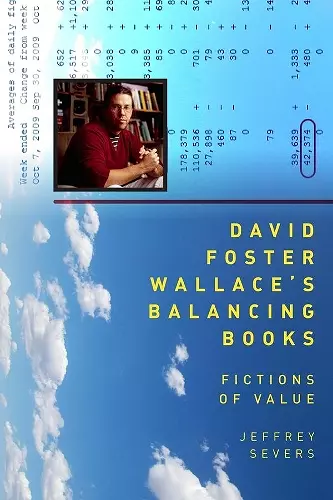David Foster Wallace's Balancing Books
Fictions of Value
Format:Hardback
Publisher:Columbia University Press
Published:24th Jan '17
Currently unavailable, and unfortunately no date known when it will be back

What do we value? Why do we value it? And in a neoliberal age, can morality ever displace money as the primary means of defining value? These are the questions that drove David Foster Wallace, a writer widely credited with changing the face of contemporary fiction and moving it beyond an emotionless postmodern irony. Jeffrey Severs argues in David Foster Wallace's Balancing Books that Wallace was also deeply engaged with the social, political, and economic issues of the twentieth and twenty-first centuries. A rebellious economic thinker, Wallace satirized the deforming effects of money, questioned the logic of the monetary system, and saw the world through the lens of value's many hidden and untapped meanings. In original readings of all of Wallace's fiction, from The Broom of the System and Infinite Jest to his story collections and The Pale King, Severs reveals Wallace to be a thoroughly political writer whose works provide an often surreal history of financial crises and economic policies. As Severs demonstrates, the concept of value occupied the intersection of Wallace's major interests: economics, work, metaphysics, mathematics, and morality. Severs ranges from the Great Depression and the New Deal to the realms of finance, insurance, and taxation to detail Wallace's quest for balance and grace in a world of excess and entropy. Wallace showed characters struggling to place two feet on the ground and restlessly sought to "balance the books" of a chaotic culture. Explaining why Wallace's work has galvanized a new phase in contemporary global literature, Severs draws connections to key Wallace forerunners Don DeLillo, Thomas Pynchon, and William Gaddis, as well as his successors-including Dave Eggers, Teddy Wayne, Jonathan Lethem, and Zadie Smith-interpreting Wallace's legacy in terms of finance, the gift, and office life.
Since its inception, David Foster Wallace studies has focused on a relatively small set of themes-irony, sincerity, addiction, and the mass media-often centered on Wallace's own descriptions of his literary project in interviews and essays. Severs's insightful new study builds on and challenges this critical orthodoxy, revealing how Wallace was a careful economic, political, and historical thinker. Wallace's writing, as Severs shows in a series of original and bracing chapters that cover the author's whole career, engaged provocatively with the New Deal, the social-welfare state, the monetary system, and the history of neoliberalism. Severs uncovers a new domain of questions that will dominate debates about Wallace's legacy and the meaning of his important art for decades to come. -- Lee Konstantinou, author of Cool Characters: Irony and American Fiction From this study, David Foster Wallace emerges as a 'rebellious economic thinker,' as well as a literary innovator and cultural critic. Severs has mastered Wallace's fiction and examines it through neoliberal policies to show seams of value-moral and economic-running throughout. Attentive to history and language, Severs demonstrates how Wallace represents work as a form of grace, weight as a means of uplift, and balance as an elusive aim. -- Heather Houser, author of Ecosickness in Contemporary U.S. Fiction: Environment and Affect Jeffrey Severs has an archivist's nose for the 'good stuff' from David Foster Wallace's papers at the Ransom Center; he has an eagle eye for motifs that circulate from one Wallace book to another; and he is uncannily skillful in making apposite connections between Wallace and his precursors, contemporaries, and successors. Only someone as widely and deeply read in late-twentieth and early-twenty-first century literature as Severs could have pulled this off. -- Brian McHale, Distinguished Arts and Humanities Professor, Ohio State University
ISBN: 9780231179447
Dimensions: unknown
Weight: unknown
328 pages